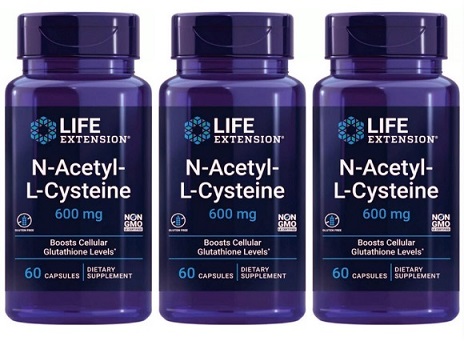Indonesian Study Reveals Powerful Potential of N-Acetylcysteine (NAC) for Parkinson's Disease
Nikhil Prasad Fact checked by:Thailand Medical News Team May 29, 2025 8 months, 3 weeks, 4 days, 20 hours, 37 minutes ago
Medical News: A new research analysis led by scientists from Universitas Sebelas Maret in Indonesia has brought renewed attention to a well-known antioxidant compound called N-acetylcysteine (NAC), suggesting it could be a powerful aid in the battle against Parkinson’s disease—a debilitating condition that affects millions worldwide. Their findings, which explore decades of scientific work, offer a big picture look at how NAC could influence Parkinson’s disease at a molecular level.
 Indonesian Study Reveals Powerful Potential of N-Acetylcysteine (NAC) for Parkinson's Disease
Indonesian Study Reveals Powerful Potential of N-Acetylcysteine (NAC) for Parkinson's Disease
Parkinson’s disease is a progressive brain disorder that leads to problems with movement, stiffness, and tremors. It primarily damages dopamine-producing neurons in a part of the brain called the substantia nigra. Despite ongoing research, current treatments only manage symptoms—they do not stop or reverse the disease. This
Medical News report dives into an extensive bibliometric study that analyzed 421 published scientific articles from 1985 to 2024, aiming to understand how NAC has been used and explored as a possible treatment for Parkinson’s.
What Is NAC and Why Is It Important
NAC is a compound that acts as a powerful antioxidant. It is already approved and widely used as an antidote for paracetamol (acetaminophen) poisoning and for treating lung conditions due to its mucus-thinning effects. But researchers have been increasingly studying NAC for its protective abilities in brain-related disorders, especially those involving oxidative stress and inflammation—two hallmarks of Parkinson’s disease.
The researchers used bibliometric tools such as VOSviewer and Biblioshiny to analyze trends in NAC-related studies, identifying four major research themes. These themes included NAC’s role in reducing oxidative stress, improving mitochondrial health, clearing abnormal protein clumps in the brain, and fighting inflammation.
Key Findings from the Research Clusters
The first theme linked NAC to protection against oxidative stress, which refers to cellular damage caused by free radicals. Dopaminergic neurons in Parkinson’s are particularly vulnerable to oxidative damage. Laboratory experiments showed NAC can neutralize harmful reactive oxygen species (ROS), prevent cell death, and protect these neurons.
The second theme explored how NAC helps the body dispose of toxic proteins like alpha-synuclein, which accumulate in the brains of Parkinson’s patients and form Lewy bodies. NAC appears to support the brain’s clean-up systems, including the ubiquitin-proteasome pathway and autophagy, by reducing ROS and improving cell survival.
The third cluster of studies highlighted NAC’s impact on mitochondria—the energy-producing structures in cells. Mitochondrial dysfunction is a major feature of Parkinson’s. In both animal and cellular models, NAC improved mitochondrial health, boosted energy p
roduction, and reduced cell death by preserving critical proteins such as Parkin.
The final research theme centered on inflammation. NAC was found to reduce neuroinflammation by suppressing inflammatory markers and pathways, including the toll-like receptor 2 (TLR2) system, which is often overactivated in Parkinson’s brains.
Is There Hope for NAC in Human Treatments
Although most of the findings come from animal studies or lab tests, early human research has shown promise. One small study found that Parkinson’s patients receiving NAC experienced improved symptoms and increased dopamine transporter binding in their brains. Oral and intravenous NAC were both shown to increase glutathione—a key antioxidant—in the brain, which is often found to be low in people with Parkinson’s.
Despite its promising effects, clinical trials in humans remain limited. However, because NAC is already widely available, relatively safe, and inexpensive, researchers believe it holds great potential for repurposing as a therapy for Parkinson’s disease.
Why This Study Matters
The research, led by Dr. Muthmainah and her team from Universitas Sebelas Maret’s Faculty of Medicine and supported by experts at The Florey Institute, emphasizes the growing interest in using old drugs in new ways. Their detailed network analysis not only tracked the evolution of NAC research over nearly four decades but also pinpointed areas that are ripe for further exploration.
They call for more rigorous clinical trials to investigate NAC’s effectiveness in human Parkinson’s patients and hope their study can guide researchers around the world to pursue this underexplored but potentially revolutionary treatment path.
Conclusion
Parkinson’s disease continues to rob individuals of their mobility, independence, and quality of life. While current drugs can ease symptoms, they do not address the root causes of the disease. This new analysis underscores the promise of NAC, a compound already sitting on pharmacy shelves, as a possible treatment that could modify the course of the illness. Its antioxidant, anti-inflammatory, and mitochondrial-protective properties make it a strong candidate for future clinical trials. The fact that NAC is safe, affordable, and accessible strengthens its appeal. If proven effective in humans, NAC could shift how we approach Parkinson’s care and offer new hope to patients and families struggling with this cruel disease.
The study findings were published in the peer reviewed Journal of Taibah University Medical Sciences.
https://www.sciencedirect.com/science/article/pii/S1658361225000496
For the latest on Parkinson’s Disease, keep on logging to Thailand
Medical News
Read Also:
https://www.thailandmedical.news/news/potential-of-n-acetylcysteine-in-treating-acute-lung-injury
https://www.thailandmedical.news/news/n-acetyl-cysteine-as-a-potential-treatment-for-alzheimer-s-disease
https://www.thailandmedical.news/news/breaking-covid-19-drugs-study-shows-that-n-acetylcysteine-or-nac-is-an-effective-antiviral-and-immunomodulatory-drug-against-all-sars-cov-2-variants
https://www.thailandmedical.news/news/medical-news-polish-study-finds-n-acetylcysteine-and-sulodexide-exhibits-protective-properties-on-endothelial-cells-exposed-to-sars-cov-2
https://www.thailandmedical.news/news/study-finds-that-glycine-and-n-acetylcysteine-glynac-supplementation-can-treat-cognitive-decline-and-improve-brain-health-in-the-aged-
https://www.thailandmedical.news/pages/thailand_doctors_listings
